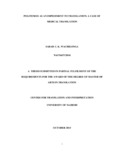| dc.description.abstract | The objective of this paper was to establish how politeness can be an impediment in the
process of translating a medical text from English to Kiswahili. Translation does not only
deal with the transfer of meanings from one language to another, it also involves the
transfer of cultural aspects from the source to the target culture. These cultures use
different languages in any given pragmatic set-up, some cultures use polite language in
their communication while others use candid and more explicit language.
The study was based on the politeness and face - work theories by Brown Levinson
(1987) and Goffman (1959). These theories were used to show how socio-cultural,
ideological and interactional contexts dictates the level of politeness in the Swahili
culture and how in the end, these factors could be an impediment in the process of
translating a medical text from English to Kiswahili. In chapter two, it was evident that
the Swahili culture uses two languages, the hard language and the polite one. When a
translator tries to show the positive politeness and “face saving” factors in translating a
medical text from English to Kiswahili, they could end up passing a message with
distorted meaning. Chapter three dealt more with how the socio-cultural aspects affect the
process of translation and how these aspects directly dictate the level of politeness in the
Swahili culture. At the ideological and interactional level, it was depicted how the lexical
choice and foreignizing aspects of translation are closely related to the polite nature of
Swahili, this was discussed in details in chapter four.
The data used in used in this study was purposefully sourced from online sources. In
chapter two, the English version of the FGM data was sourced online and given to,
Fredrick Otiato for translation (He is a freelance translator working with ST
Communications since 2009). Both the English and Kiswahili texts on obstetric fistula
were obtained online. In chapter three, the English text was sourced online and its
translation to Kiswahili done by Michael Odhiambo of Radio Maisha Kenya. The data
used in chapter 4 was obtained from an online book called “Where there is no doctor”
whose Kiswahili version is “Pahali pasipokuwa na daktari” the back translation was then
done by Fredrick Otiato. The analyzed data revealed how indeed politeness could be an
impediment in medical translation.
The study was specifically vital in showing how politeness can cause misinterpretation of
medical texts that could in some cases have serious repercussions on human life.
The study recommends that a medical translator should not be enslaved to the polite
culture of the Swahili; instead, they should use the candid and explicit language in their
translation in order to avoid any possible misinterpretations. It also recommends that
translators should “foreignize” their translations so as to strike a balance between passing the intended message to the target audience and respecting the source culture. | en_US |

